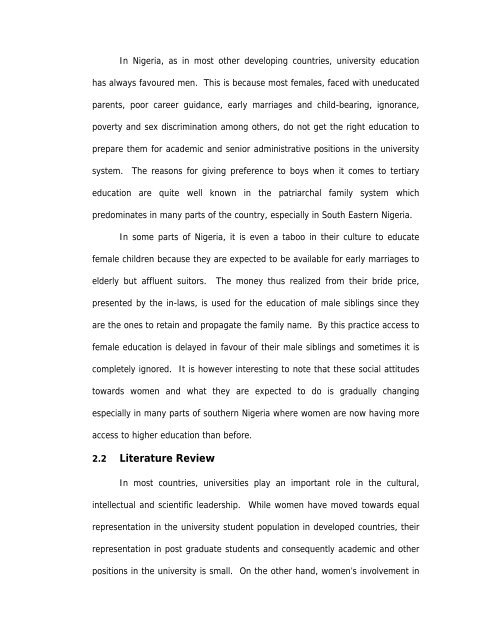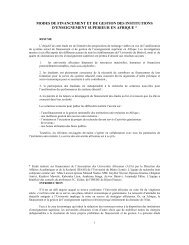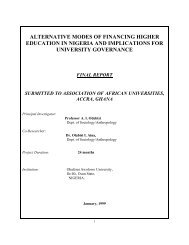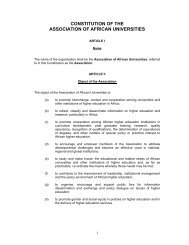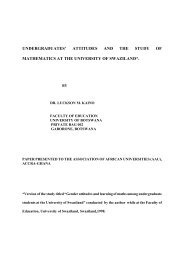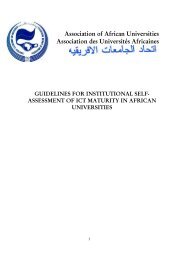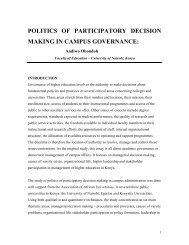women in academic positions in the universities in nigeria
women in academic positions in the universities in nigeria
women in academic positions in the universities in nigeria
You also want an ePaper? Increase the reach of your titles
YUMPU automatically turns print PDFs into web optimized ePapers that Google loves.
In Nigeria, as <strong>in</strong> most o<strong>the</strong>r develop<strong>in</strong>g countries, university educationhas always favoured men. This is because most females, faced with uneducatedparents, poor career guidance, early marriages and child-bear<strong>in</strong>g, ignorance,poverty and sex discrim<strong>in</strong>ation among o<strong>the</strong>rs, do not get <strong>the</strong> right education toprepare <strong>the</strong>m for <strong>academic</strong> and senior adm<strong>in</strong>istrative <strong>positions</strong> <strong>in</strong> <strong>the</strong> universitysystem. The reasons for giv<strong>in</strong>g preference to boys when it comes to tertiaryeducation are quite well known <strong>in</strong> <strong>the</strong> patriarchal family system whichpredom<strong>in</strong>ates <strong>in</strong> many parts of <strong>the</strong> country, especially <strong>in</strong> South Eastern Nigeria.In some parts of Nigeria, it is even a taboo <strong>in</strong> <strong>the</strong>ir culture to educatefemale children because <strong>the</strong>y are expected to be available for early marriages toelderly but affluent suitors. The money thus realized from <strong>the</strong>ir bride price,presented by <strong>the</strong> <strong>in</strong>-laws, is used for <strong>the</strong> education of male sibl<strong>in</strong>gs s<strong>in</strong>ce <strong>the</strong>yare <strong>the</strong> ones to reta<strong>in</strong> and propagate <strong>the</strong> family name. By this practice access tofemale education is delayed <strong>in</strong> favour of <strong>the</strong>ir male sibl<strong>in</strong>gs and sometimes it iscompletely ignored. It is however <strong>in</strong>terest<strong>in</strong>g to note that <strong>the</strong>se social attitudestowards <strong>women</strong> and what <strong>the</strong>y are expected to do is gradually chang<strong>in</strong>gespecially <strong>in</strong> many parts of sou<strong>the</strong>rn Nigeria where <strong>women</strong> are now hav<strong>in</strong>g moreaccess to higher education than before.2.2 Literature ReviewIn most countries, <strong>universities</strong> play an important role <strong>in</strong> <strong>the</strong> cultural,<strong>in</strong>tellectual and scientific leadership. While <strong>women</strong> have moved towards equalrepresentation <strong>in</strong> <strong>the</strong> university student population <strong>in</strong> developed countries, <strong>the</strong>irrepresentation <strong>in</strong> post graduate students and consequently <strong>academic</strong> and o<strong>the</strong>r<strong>positions</strong> <strong>in</strong> <strong>the</strong> university is small. On <strong>the</strong> o<strong>the</strong>r hand, <strong>women</strong>’s <strong>in</strong>volvement <strong>in</strong>


